- Home
- Vasily Grossman
Life and Fate Page 2
Life and Fate Read online
Page 2
Grossman died in 1964, aged fifty-eight, in terrible pain from cancer. For another twenty years after his death, Life and Fate was in the black hole of Soviet censorship, until the 1980s, when an edition appeared in France. In 1984 one of the Soviet Union’s leading dissident writers, Vladimir Voinovich, admitted that it was he, together with the help of the Nobel Prize winning physicist Andrei Sakharov, who had smuggled a microfilm out to the West.
One of Grossman’s other regrets was that he had not been allowed to edit his novel. What you are about to read is a copy from an imperfect microfilm of an imperfect book. Its length is unwieldy, the cast of characters overwhelming, its structure anything but tight. Grossman often writes in the pedestrian, utilitarian prose known as socialist realism (there would have been no chance of publication on any subject had he tried a literary form not approved by the state). Still, there are many occasions of blunt beauty in the intensity of his observation, gained from his years as a reporter: ‘Blinking their scorched eyelashes [the soldiers] forced their way back to the bunkers through the thickets of red dog-rose.’
The impact of Life and Fate is not to be found in its style, but in the cumulative effect of the stories Grossman tells about his characters; the living are full of life, arguing, making love, crying and worrying. At its centre are the Shaposhnikova sisters, Lyudmila, married to Viktor Shtrum, a Jewish nuclear physicist working in a Moscow lab; Yevgenia, the divorced wife of Krymov, a commissar in the Red Army, fighting the Battle of Stalingrad; and Marusya, wife of the director of the Stalingrad power station.
Beyond this circle lie the radiating lives of all those they are connected to: Lyudmila’s son Tolya, fighting at the Front; the sisters’ brother Dmitry, a political prisoner, and his son Seryozha; another soldier; Viktor’s mother, trapped behind enemy lines, and Sofya, one of the sisters’ friends, who is on a train en route to the gas chamber. Life and Fate, like its nineteenth century counterpart War and Peace, to which it is frequently compared, encompasses the whole of Soviet life, from Stalin down to the luckless peasant in the line of fire. In hearing their stories, the reader is rubbed raw by life. Characters appear, we become immersed in their thoughts, their feelings, their conversations, their romantic dreams and jealousies, and in a sentence they are wiped out: by a bullet or the sinister knock at the door. How can life end in the middle of the story? Because life always does.
Writing the novel in the Fifties, a decade after the events he describes, Grossman was still consumed with grief for the death of his mother, murdered in the massacre at the Berdichev ghetto and the strains this had placed on his marriage. His own unhappiness is reflected in the story of Viktor and his mother. One of the best-known and most powerful chapters is the letter she sends him from the ghetto, describing the gradual deterioration of conditions for the Jews, and her knowledge that she will not survive. Yet, like the whole book, even this chapter ends with an exhortation to live, indeed the hope that her son lives for ever.
Grossman was born in Berdichev, a Ukrainian town which at the turn of the twentieth century was then home to one of Europe’s largest Jewish populations, at one time it had eighty synagogues. Both his parents were Jewish, assimilated, educated and well-off. The family were not dwellers in the shtetls of Isaac Bashevis Singer; if they had been they were more likely to have emigrated to America around the time of their son’s birth. They are believed to have met in Switzerland where his father was active in the revolutionary movement, and both were political activists who believed that the road to Jewish emancipation lay in the struggle for universal equality. A tragic error, as it turned out, and a bad choice for them personally. The couple separated early on, and Grossman’s mother would find work as a French teacher.
Grossman married twice. His second wife, like Viktor’s, was divorced from a previous husband who had been arrested and shot during the Great Terror of 1937, when the revolution devoured its own founders. She and her mother-in-law did not get on; had they done, his mother would probably have been living with them in Moscow, instead of in Nazi-occupied Ukraine where she met her death.
The horror of the Holocaust, which Grossman had witnessed at first-hand at Treblinka, the fate of his mother and the terrifying period of the Doctors’ Plot1 in the years just before Stalin’s death when, for the second time in the century, state-sponsored anti-Semitism was directed at the country’s Jews, combined to increase Grossman’s sense of his own Jewish identity – not religiously, but he seems to have become conscious that universal liberation, the Bolshevik ideal, would in practice continue to be suffused with persecution and prejudice.
He, like everyone else who survived the period of the 1937 show trials which liquidated the revolutionaries of 1917, came to understand that guilt and innocence are meaningless when the state decides the nature of reality. For those of us living comfortably in the democratic West, it is difficult to understand the mental contortions that a person must make in order to survive both physically and with any form of inner moral code intact. Grossman takes us into the interrogation rooms and shows how an innocent man will confess to crimes he has not committed. Like Grossman, in the years of the Doctors’ Plot when he was repeatedly and hysterically attacked as a Jew and a reactionary and had to write a ‘letter of repentance’, Viktor Shtrum finds himself out of favour. The nuclear physics in which he’s carrying out his research is deemed to be ‘Jewish’ (because of the connection with Einstein) and hence unpatriotic. Viktor is made persona non grata, and then, with a single phone call, rehabilitated. In the months afterwards he feels that his rehabilitation is the normal state, until a moral dilemma forces him to confront the terrible nature of life in a system based on denunciation in the name of a higher good, where the Party is more important than the individual, where ideas are granted higher status than human life.
Life and Fate contains some of the most tragic scenes ever written in world literature. A fifty-year-old unmarried doctor, who has never felt a hand on her own body since childhood, finds an unaccompanied boy in the cattle car leading to the gas chamber. When she has the chance to avoid her death, she chooses instead to hold the child’s hand as they are herded in to be murdered. Her final thought before the gas fills her lungs is that at last she is a mother. Individual acts of often senseless tender kindness light up the darkness of Grossman’s world. A soldier leaning forward to kiss a girl radio operator first tactfully brushes away a louse from the collar of her uniform.
Nothing human is off-limits to Grossman. We see Hitler go for a walk in the forest on his own and, despite the presence of thousands of armed guards at the perimeter, he still falls pray to the atavistic, fairytale fears of unseen presences in the woods. Leaving the cattle cars to enter the extermination camp, a ‘curly-headed man on all fours [drinks] from a puddle’ and a ‘hunch-backed woman [lifts] up her skirt to adjust the torn elastic of her knickers’. And in one of the most finely observed passages in literature, falling snow settles into the ears of dead German soldiers, lying on their sides waiting to be buried.
By the end of Life and Fate, the Battle of Stalingrad has been won, Nazi Germany is retreating. The defeated German army, the pride of the Reich, looks, to one of its officers, like a scene from the Stone Age, unshaven man reduced to hacking frozen horsemeat from the sides of a dead horse. In Stalingrad, a building that had started out as a tailor’s and dry-cleaner’s had been taken over as a German machine gun emplacement, and now the holes for their weapons are used to hand out the liberated town’s bread rations to queuing women.
The triumph over fascism for Grossman is partly that of armed men (he was no pacifist) but the novel’s insurrectionary observation was that the Soviet system, as totalitarian as fascism, had the same impulse to collectivise and dominate the individual. He sees all human groupings as bound by the same desire to win or defend the individual’s right ‘to be special, to think, feel and live in his or her own way’. But we fall prey to the belief that the race, the God or the party are the purpose of life, an
d not a means to an end. Those of us who grew up in the West in times of unparalleled peace and prosperity would do well to remember that Grossman’s lesson is as relevant now as in the black years of Stalinism and Nazism. The right to be oneself, however modestly ordinary that self is, is not granted to millions in the world today, whether it is because of repressive political systems or religious ideology. Grossman’s plea, to be left alone, continues to resonate, whether it is a man building a cathedral from matchsticks or a teenager choosing a mobile phone ringtone. Without these modest peculiarities, we are ciphers.
In the seven years since I first read Life and Fate I have urged all my friends to read it. In part this is from a sense of obligation to a great writer, to rescue his masterpiece from state-sponsored obscurity. But it is also because I want others to feel as I have done – that they are entering the heart of the twentieth century, touching its pulse. When Life and Fate was ‘arrested’, Grossman said that ‘they strangled me in a doorway’. The novel should be as famous as Doctor Zhivago or The Gulag Archipelago. It will become so when it finds a critical mass of readers who understand that all that matters is the individual and the furious joy of being alive, to live as human beings and to die as human beings, not the mouthpieces of unreality.
Linda Grant, 2011
Footnotes
1 The Doctors’ Plot: In 1952, the increasingly paranoid Stalin believed there was a plot by Jewish doctors to assassinate him. Scores of Soviet Jews were dismissed from their jobs, arrested, sent to the Gulag or executed, accompanied by anti-Semitic propaganda in the state-run mass media.
Introduction by the Translator Robert Chandler
‘Speaking for Those Who Lie in the Earth’: The Life and Work of Vasily Grossman
Vasily Semyonovich Grossman was born on December 12, 1905 in Berdichev, a Ukrainian town that was home to one of Europe’s largest Jewish communities. His parents were Jews and they originally named their son Iosif. Being highly Russified, however, they usually called him Vasily or Vasya – and this is how he has always been known. At some point in his early childhood his parents appear to have separated. Vasily was brought up by his mother; a wealthy uncle helped financially. From 1910 to 1912 Vasily and his mother lived in Switzerland, probably in Geneva. His mother, Yekaterina Savelievna, was later to work as a French teacher, and Vasily would retain a good knowledge of French throughout his life. From 1914 to 1919 he attended secondary school in Kiev and from 1924 to 1929 he studied chemistry at Moscow State University.1 There he soon realized that his true vocation was literature. He never, however, lost interest in science; it is not for nothing that Viktor Shtrum, the central figure of Life and Fate and in many respects a self-portrait, is a nuclear physicist.
After graduating, Grossman moved to the industrial region known as the Donbass, working as a safety inspector in a mine and as a chemistry teacher in a medical institute. In 1932 he was able to return to Moscow, and in 1934 he published both ‘In the Town of Berdichev’ – a short story that won the admiration of such different writers as Maksim Gorky, Boris Pilnyak and Isaak Babel – and a novel, Glyukauf,2 about the life of the Donbass miners. In 1937 Grossman was admitted to the prestigious Union of Soviet Writers. His novel, Stepan Kol’chugin (published 1937–40) was nominated for a Stalin Prize.
Critics have often divided Grossman’s life into two parts. Tzvetan Todorov, for example, claims that ‘Grossman is the only example, or at least the most significant, of an established and leading Soviet writer changing his spots completely. The slave in him died, and a free man arose.’3 This sounds impressive, but it is wrong to draw so absolute a distinction between the ‘conformist’ writer of the 1930s and 1940s and the ‘dissident’ who went on to write Life and Fate and Everything Flows. Glyukauf may seem dull today, but it must once have had some power to shock; in 1932 Gorky criticized a draft for ‘naturalism’ – a Soviet code word for presenting too much unpalatable reality. At the end of his report Gorky suggested that the author should ask himself: ‘Why am I writing? Which truth am I confirming? Which truth do I wish to triumph?’4 Even then such a cynical attitude to truth would almost certainly have been anathema to Grossman. It is hard, however, not to be impressed by Gorky’s intuition; it is as if he sensed where Grossman’s love of truth might lead him. In ‘Four Days’, a story written a few years later, Grossman quoted the maxim ‘Absolute truth is the most beautiful thing of all’; and in 1961, after the manuscripts of Life and Fate had been confiscated, Grossman would write to Khrushchev, ‘I have written in my book what I believed, and continue to believe, to be the truth. I have written only what I have thought through, felt through and suffered through.’5
Something about Grossman – his love of truth, or perhaps his critical intelligence – seems to have alarmed not only Gorky, but also Stalin. Like Glyukauf, Stepan Kol’chugin may seem orthodox enough today, but Stalin deleted it from the list of Stalin Prize nominees, apparently saying that this novel about a young revolutionary was ‘Menshevik in sympathy’.6 Grossman was, in reality, neither a Menshevik nor a martyr; nevertheless, he showed considerable courage during the years of the Great Terror. In 1938, when his second wife, Olga Mikhailovna, was arrested, Grossman adopted her two sons by her previous husband, Boris Guber, who had himself been arrested the previous year; but for Grossman’s prompt action, the boys might have been sent to one of the camps for children of ‘enemies of the people’. Grossman then wrote to Yezhov, the head of the NKVD,7 pointing out that Olga Mikhailovna was now his wife, not Guber’s, and that she should not be held responsible for her former husband, with whom she had broken completely; later that year Olga Mikhailovna was released.8 Grossman’s friend, Semyon Lipkin, commented, ‘All this may seem normal enough, but (. . .) only a very brave man would have dared to write a letter like this to the State’s chief executioner.’9 It was around this time that Grossman began work on several stories about arrests and denunciations; these were first published only in the 1960s.
Grossman’s move towards dissidence was a gradual one; no single event should be seen as uniquely important. Like most people, he acted inconsistently. Throughout the war years he appeared to feel no fear of either the Germans or the NKVD; in 1952, however, as Stalin’s anti-Jewish campaign gathered momentum, Grossman agreed to sign an official letter calling for the harshest punishment of the Jewish doctors allegedly involved in a plot against Stalin’s life.10
Grossman’s weakness at this moment may seem surprising. It is possible that it was a momentary aberration; just before being asked to sign, Grossman had quarrelled with the poet and editor, Aleksandr Tvardovsky and he was, no doubt, feeling confused.11 Life and Fate, however, is almost an encyclopaedia of the complexities of life under totalitarianism, and no one has articulated better than Grossman how hard it is for an individual to withstand its pressures: ‘But an invisible force was crushing him. He could feel its weight, its hypnotic power; it was forcing him to think as it wanted, to write as it dictated. This force was inside him; it could dissolve his will and cause his heart to stop beating (. . .) Only people who have never felt such a force themselves can be surprised that others submit to it. Those who have felt it, on the other hand, feel astonished that a man can rebel against it even for a moment – with one sudden word of anger, one timid gesture of protest.’12
Grossman was always fiercely self-critical. He condemned himself, above all, for his failure to get his mother evacuated from Berdichev after the German invasion in 1941. He also, however, blamed his wife, who did not get on with his mother; shortly before the war, Grossman had suggested they invite his mother to live with them in their Moscow flat and Olga Mikhailovna had said that there was not enough room.13 In September 1941, Yekaterina Savelievna was killed by the Germans, along with most of the other 12,000 Jews who lived in Berdichev. After Grossman’s death, an envelope was found among his papers; in it were two letters he had written to his dead mother in 1950 and 1961, on the ninth and twentieth anniversaries of her death, along with two phot
ographs. In the first letter Grossman writes, ‘I have tried dozens, or maybe hundreds of times, to imagine how you died, how you walked to meet your death. I tried to imagine the person who killed you. He was the last person to see you. I know you were thinking about me (. . .) during all that time.’14 One photograph shows his mother with Vasily when he was still a child; the other, taken by Grossman from a dead SS officer, shows hundreds of naked dead women and girls in a large pit. His mother’s death, Grossman’s guilt and the ensuing recriminations between Grossman and his wife are all reflected in Life and Fate. I know no more powerful lament for East European Jewry than the letter that Anna Semyonovna, a fictional portrait of Grossman’s mother, writes to her son and manages to have smuggled out of the Jewish ghetto.15
Grossman may have looked on the war as a chance to redeem himself. He volunteered as an ordinary soldier, despite his bad eyesight and poor health. Assigned instead to Red Star (Krasnaya Zvezda), the Red Army newspaper, he quickly won acclaim as a war correspondent, impressing almost everyone with his tenacity and courage. He covered all the main battles, from the defence of Moscow to the fall of Berlin, and his articles were valued by soldiers and generals alike. Groups of frontline soldiers would gather round while one of them read aloud from a single copy of Red Star; the writer, Viktor Nekrasov, who fought at Stalingrad, remembers how ‘the papers with (Grossman’s) and Ehrenburg’s articles were read and reread by us until they were in tatters.’16

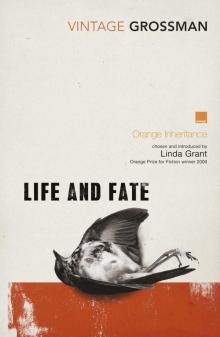 Life and Fate
Life and Fate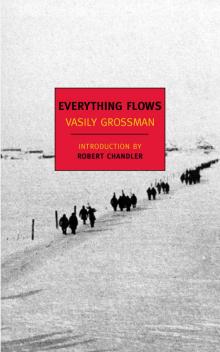 Everything Flows
Everything Flows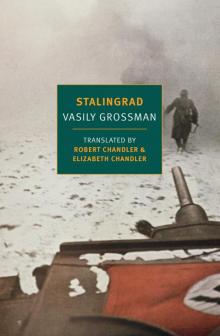 Stalingrad
Stalingrad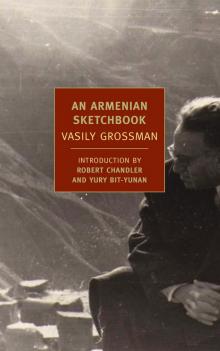 An Armenian Sketchbook
An Armenian Sketchbook The Road
The Road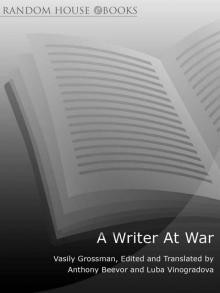 A Writer at War
A Writer at War